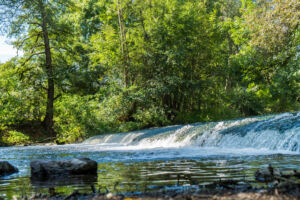Germany faces the challenge of dealing with increasing water extremes such as droughts, heavy rainfall, and flooding. These phenomena jeopardize water availability, exacerbate conflicts of use between agriculture, industry, and nature conservation, and threaten ecosystems and security of supply. The research project “Guiding concepts for a regional, near-natural landscape water balance” brings together scientists and practitioners to develop a method for creating local and regional guiding principles. These describe what a functional and near-natural water balance should look like in Germany's various natural areas. The guiding concepts serve as a basis for sustainable decisions and measures that strengthen the resilience of ecosystems and ensure the long-term availability of water for humans and nature. The aim of the project is to develop a practical guide that enables stakeholders in specialist authorities, local authorities, and water management to assess the current state of the landscape water balance, identify deviations from the natural ideal, and implement targeted measures for improvement – thereby increasing adaptability to climate change.
Research approach
The project pursues a transdisciplinary and participatory research approach that combines scientific, hydrological modeling with socio-ecological expertise and practical knowledge. The ISOE research team is taking on key tasks in this regard: It is identifying and engaging relevant stakeholders from water management, nature conservation, agriculture, politics, and administration – for example, through stakeholder analyses, structured surveys, and a workshop with technical experts. In addition, ISOE scientists are assessing the current status and the knowledge needs identified in regional water supply concepts. The team is also developing an expert questionnaire and analyzing the results of the survey with the aim of designing the guiding concepts in a way that is tailored to the target group and application-oriented. Of particular importance here is the development of presentation formats and narratives tailored to the target group that promote acceptance of the models. Through this interface function, ISOE ensures that the method is not only scientifically sound, but also practical and takes into account the complex interests of those involved. This creates the basis for broad implementation in regional water and climate adaptation strategies.
Background
The concept of the landscape water balance describes the complex interaction of precipitation, evaporation, groundwater recharge, runoff, and water storage in ecosystems. It is the basis for the preservation of intact ecosystems, a secure drinking water supply, productive agriculture, and protection against extreme events such as droughts or floods. A near-natural landscape water balance ensures that water is retained in the landscape for longer – for example, through intact soils, wetlands, and natural watercourses. This replenishes groundwater reserves, dampens flood peaks, and mitigates dry periods. However, drainage, sealing, and intensive land use have disrupted this cycle in many regions: water flows away more quickly, groundwater levels are falling, and ecosystems are losing their regulatory function. The consequences are noticeable: declining agricultural yields, conflicts over water resources, and increasing damage from extreme weather. A functioning water balance is therefore not only ecologically but also economically and socially of central importance – especially in the context of climate change, which further exacerbates these challenges.
Research and project partners
Helmholtz Centre for Environmental Research (UFZ)
Funding
The project “Guiding concepts for a regional, near-natural landscape water balance – development of a derivation method” is funded by the German Federal Environment Agency (UBA) as part of the departmental research plan (ReFo-Plan FKZ 3725 NK 201 0). ISOE is a subcontractor of the Helmholtz Centre for Environmental Research (UFZ) in Halle.
Contact:


